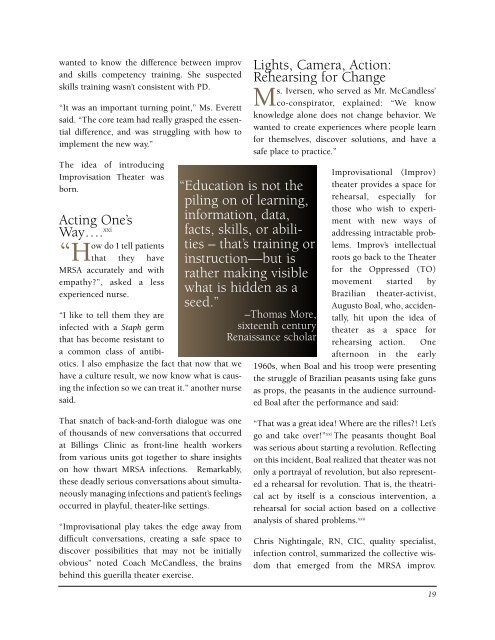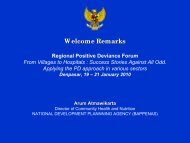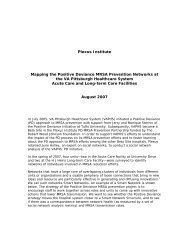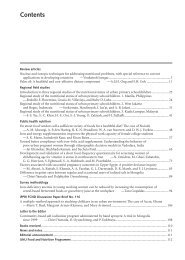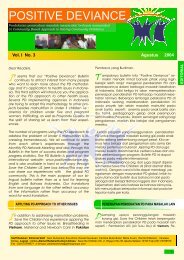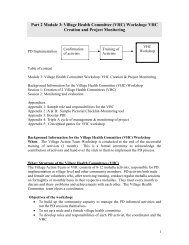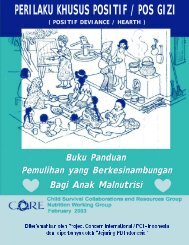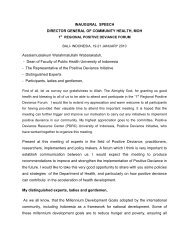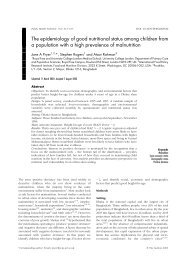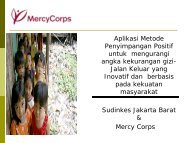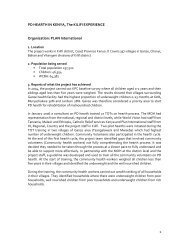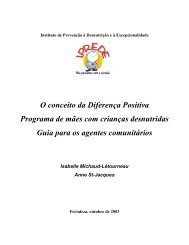From Invisible to Visible - Positive Deviance Initiative
From Invisible to Visible - Positive Deviance Initiative
From Invisible to Visible - Positive Deviance Initiative
Create successful ePaper yourself
Turn your PDF publications into a flip-book with our unique Google optimized e-Paper software.
wanted <strong>to</strong> know the difference between improv<br />
and skills competency training. She suspected<br />
skills training wasn’t consistent with PD.<br />
“It was an important turning point,” Ms. Everett<br />
said. “The core team had really grasped the essential<br />
difference, and was struggling with how <strong>to</strong><br />
implement the new way.”<br />
The idea of introducing<br />
Improvisation Theater was<br />
born.<br />
Acting One’s<br />
Way…. xxi<br />
“H<br />
ow do I tell patients<br />
that they have<br />
MRSA accurately and with<br />
empathy?”, asked a less<br />
experienced nurse.<br />
“I like <strong>to</strong> tell them they are<br />
infected with a Staph germ<br />
that has become resistant <strong>to</strong><br />
a common class of antibiotics.<br />
I also emphasize the fact that now that we<br />
have a culture result, we now know what is causing<br />
the infection so we can treat it.” another nurse<br />
said.<br />
“Education is not the<br />
piling on of learning,<br />
information, data,<br />
facts, skills, or abilities<br />
– that’s training or<br />
instruction—but is<br />
rather making visible<br />
what is hidden as a<br />
seed.”<br />
–Thomas More,<br />
sixteenth century<br />
Renaissance scholar<br />
Lights, Camera, Action:<br />
Rehearsing for Change<br />
Ms. Iversen, who served as Mr. McCandless’<br />
co-conspira<strong>to</strong>r, explained: “We know<br />
knowledge alone does not change behavior. We<br />
wanted <strong>to</strong> create experiences where people learn<br />
for themselves, discover solutions, and have a<br />
safe place <strong>to</strong> practice.”<br />
Improvisational (Improv)<br />
theater provides a space for<br />
rehearsal, especially for<br />
those who wish <strong>to</strong> experiment<br />
with new ways of<br />
addressing intractable problems.<br />
Improv’s intellectual<br />
roots go back <strong>to</strong> the Theater<br />
for the Oppressed (TO)<br />
movement started by<br />
Brazilian theater-activist,<br />
Augus<strong>to</strong> Boal, who, accidentally,<br />
hit upon the idea of<br />
theater as a space for<br />
rehearsing action. One<br />
afternoon in the early<br />
1960s, when Boal and his troop were presenting<br />
the struggle of Brazilian peasants using fake guns<br />
as props, the peasants in the audience surrounded<br />
Boal after the performance and said:<br />
That snatch of back-and-forth dialogue was one<br />
of thousands of new conversations that occurred<br />
at Billings Clinic as front-line health workers<br />
from various units got <strong>to</strong>gether <strong>to</strong> share insights<br />
on how thwart MRSA infections. Remarkably,<br />
these deadly serious conversations about simultaneously<br />
managing infections and patient’s feelings<br />
occurred in playful, theater-like settings.<br />
“Improvisational play takes the edge away from<br />
difficult conversations, creating a safe space <strong>to</strong><br />
discover possibilities that may not be initially<br />
obvious” noted Coach McCandless, the brains<br />
behind this guerilla theater exercise.<br />
“That was a great idea! Where are the rifles?! Let’s<br />
go and take over!” xxi The peasants thought Boal<br />
was serious about starting a revolution. Reflecting<br />
on this incident, Boal realized that theater was not<br />
only a portrayal of revolution, but also represented<br />
a rehearsal for revolution. That is, the theatrical<br />
act by itself is a conscious intervention, a<br />
rehearsal for social action based on a collective<br />
analysis of shared problems. xxii<br />
Chris Nightingale, RN, CIC, quality specialist,<br />
infection control, summarized the collective wisdom<br />
that emerged from the MRSA improv.<br />
19


